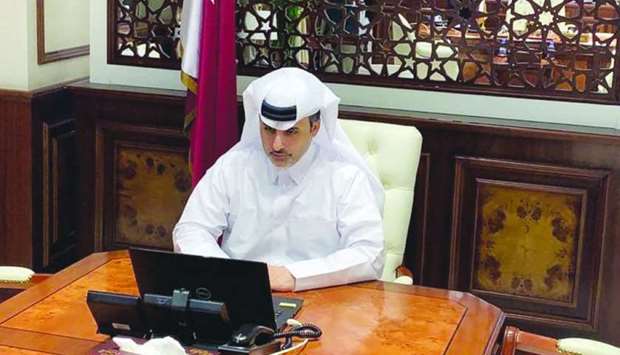Lessons learnt from the blockade in terms of food security have led to the development of a number of strategies in this area, and this resulted in Qatar being one of the least-affected countries when the Covid-19 crisis began.
This was stressed by HE the Minister of Municipality and Environment Abdullah bin Abdulaziz bin Turki al-Subaie during a webinar, 'Qatar’s Vision for Sustainable Food Security', organised by the US-Qatar Business Council (USQBC) on Tuesday.
“Post-blockade, Qatar’s food security has focused on four main pillars: international trade & logistics, to enable domestic markets, to enhance domestic self-sufficiency and to increase strategic reserves,” HE the Minister said, according to information available on the council's Twitter page.
“On food security, we have learned the hard way due to the blockade. We developed many strategies to deal with a crisis. When the global Covid-19 crisis began, the State of Qatar was one of the countries least affected," he noted.
HE the Minister said most of Qatar's initiatives and projects related to food security are targeted at the private sector. "We work closely with the Qatar Chamber so that PPP (public-private partnership) projects can start easily. We have already begun PPP projects for fisheries with our first project almost finished. Fish farming licences will be floated in the next few months where we expect a lot of private sector interest.”
At the same time, HE al-Subaie stressed that with food security, "being self-sufficient does not mean you are secure. Local production will not supersede the importance of international partnerships."
Speaking on collaborations with the US, he said: “For US partnerships, we are looking specifically to collaborate in the export of crops we are not cultivating here, technology transfer and strategic development of the Hamad Port.
"We cherish the US-Qatar relationship. One of our main challenges has been water scarcity and we must always adopt the newest technologies and innovations to overcome this. We see a large opportunity to collaborate in this area.”
Further, HE the Minister said the State "has built into Qatar National Vision 2030 great importance on environmental protection".
"The upcoming 2022 FIFA World Cup will be the first world cup that is carbon-neutral,” he added.
Another participant, Mohamed Bad?r Hashem al-Sada, said: “We already have a relationship with the US in food security. We have investments across the United States for dairy, fodder and other areas. Frozen meat, waste management, and testing/safety would be key areas we’d look at for US collaboration.”
Mohamed Barakat, USQBC managing director who moderated the webinar, said: “The green buildings, the carbon-neutral FIFA World Cup, carbon credits and other initiatives have made Qatar a leader in environmental sustainability in the region.”
“Post-blockade, Qatar’s food security has focused on four main pillars: international trade & logistics, to enable domestic markets, to enhance domestic self-sufficiency and to increase strategic reserves,” HE the Minister said, according to information available on the council's Twitter page.
“On food security, we have learned the hard way due to the blockade. We developed many strategies to deal with a crisis. When the global Covid-19 crisis began, the State of Qatar was one of the countries least affected," he noted.
HE the Minister said most of Qatar's initiatives and projects related to food security are targeted at the private sector. "We work closely with the Qatar Chamber so that PPP (public-private partnership) projects can start easily. We have already begun PPP projects for fisheries with our first project almost finished. Fish farming licences will be floated in the next few months where we expect a lot of private sector interest.”
At the same time, HE al-Subaie stressed that with food security, "being self-sufficient does not mean you are secure. Local production will not supersede the importance of international partnerships."
Speaking on collaborations with the US, he said: “For US partnerships, we are looking specifically to collaborate in the export of crops we are not cultivating here, technology transfer and strategic development of the Hamad Port.
"We cherish the US-Qatar relationship. One of our main challenges has been water scarcity and we must always adopt the newest technologies and innovations to overcome this. We see a large opportunity to collaborate in this area.”
Further, HE the Minister said the State "has built into Qatar National Vision 2030 great importance on environmental protection".
"The upcoming 2022 FIFA World Cup will be the first world cup that is carbon-neutral,” he added.
Another participant, Mohamed Bad?r Hashem al-Sada, said: “We already have a relationship with the US in food security. We have investments across the United States for dairy, fodder and other areas. Frozen meat, waste management, and testing/safety would be key areas we’d look at for US collaboration.”
Mohamed Barakat, USQBC managing director who moderated the webinar, said: “The green buildings, the carbon-neutral FIFA World Cup, carbon credits and other initiatives have made Qatar a leader in environmental sustainability in the region.”

